IoT Fleet Management Market Insights, 2031
The global IoT fleet management market was valued at USD 6.4 billion in 2021, and is projected to reach USD 16 billion by 2031, growing at a CAGR of 9.8% from 2022 to 2031.
Fleet management deals with tracking and maintenance of vehicles in a cost-effective, rapid, and accessible manner along with financing, driver management, and other features. It helps fleet owners to reduce the risks associated with staff cost, operations, and others. The benefits of adopting IoT fleet management include reduced fuel & overall running costs, enhanced safety, and optimized fleet operations with real-time fleet tracking and monitoring. IoT Fleet management is a fully integrated system used in automotive for effective maintenance plans. Moreover, it benefits businesses that are significantly dependent on transportation of goods and services, with enhanced productivity and efficiency. It integrates commercial, technical, or operational requirements and restrictions.
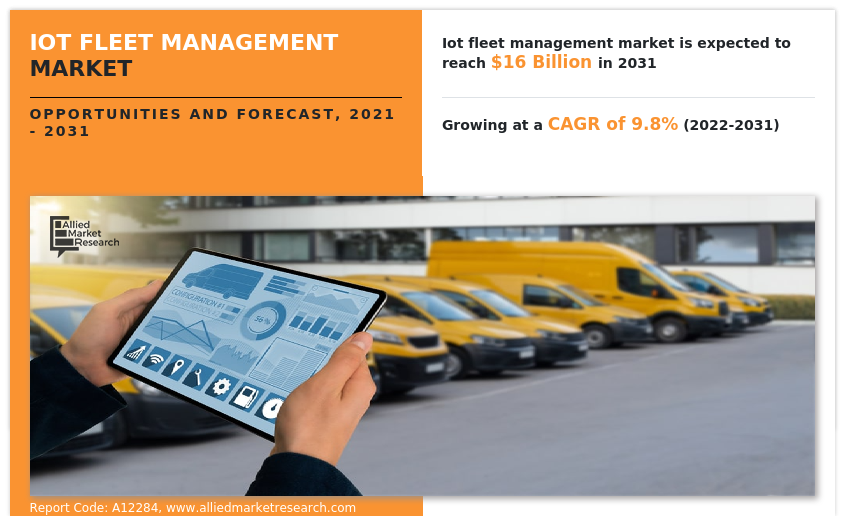
With access to real-time fleet status and fleet data, fleet managers can perform operations effectively and increase driver productivity. There has been an increase in the use of smart fleet management, in the recent years, as it offers critical alerts, real-time alerts, driver behavior, anti-theft notifications, and safety alerts. Moreover, use of smart fleet management enhances safety, ensures compliance, and reduces costs. Smart fleet operators track target transportation medium in real-time to reduce idle period and transportation costs, thereby increasing the operational efficiency of fleet management.
Factors such as technological advancements across transportation & logistics sector, and increase in use of cloud-based technology for smart fleet management solutions are anticipated to boost the growth of the global IoT fleet management market during the forecast period. However, high price of fleet management systems, and lack of uninterrupted & seamless internet connectivity are expected to hinder the growth of the global market during the forecast period. Moreover, better driver and vehicle safety, and strengthening communication network is expected to create an opportunity for the IoT fleet management industry in near future.
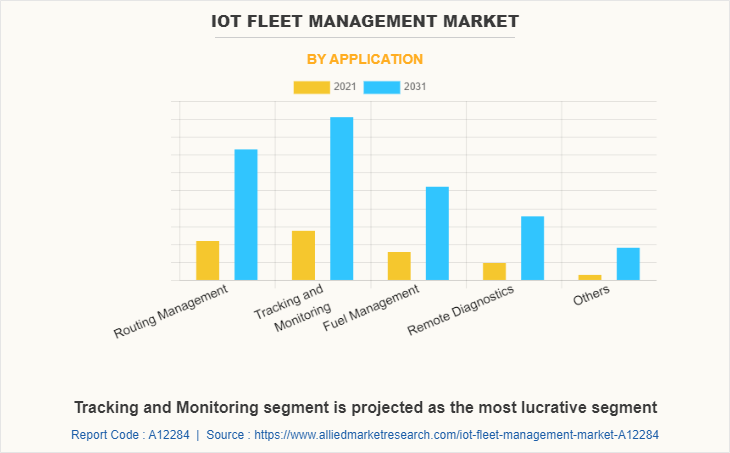
The IoT fleet management market is segmented on basis of application, service, platform, type and region. By application, it is divided into routing management, tracking & monitoring, fuel management, remote diagnostics and others. By service, it is bifurcated into professional, and managed. By platform, it is divided into application enablement platform, network management, and device management. By type, it is categorized into public, private, and hybrid. By region, the market is analyzed across North America, Europe, Asia-Pacific and LAMEA.
The key players that operate in this IoT fleet management market are AT&T Inc., Cisco Systems Inc, Fleet Complete, Honeywell International Inc., Intel Corporation, International Business Machines Corporation (IBM), Northrop Grumman Corporation, Omnitracs, Sierra Wireless, Telefonica S.A, Tomtom International BV, Trimble Inc., Verizon Communications Inc., Vnomics, and Webfleet Solution (Bridgestone Mobility Solutions B.V.).
Technological advancements across transportation & logistics sector
The transportation & logistics segment acquires a significant share within the entire supply chain, and it physically connects businesses to its supply chain partners, such as suppliers and customers, thereby increasing customer satisfaction and profit margin. Rise in integration of technology within the transportation sector has created unprecedented opportunities for operational efficiencies, sustainability, new business models, and richer customer experiences. For instance, according to the World Economic Forum, digitalization in the logistics industry could unlock a $1.5 trillion opportunity by 2025. Advanced technologies, such as Internet of Things (IoT), big data, and artificial intelligence (AI), and their predictive capabilities result in creation of smarter and more efficient transportation operations. Emerging technologies such as AI and machine learning, have enabled back-office automation, predictive operations, intelligent transportation assets, and new customer experience models. These technologies primarily aim to digitize the entire end-to-end transportation process of order management, contracting, delivering, and payment. Thus, digital innovation services right from connected warehouses to autonomous last-mile delivery services has widened the scope of transportation management system, which in turn is set to increase the productivity performance by enabling innovation and reducing the costs of a range of business processes, and thereby creating a strong foundation for fleet and transportation management which in turn expected to drive the IoT fleet management market.
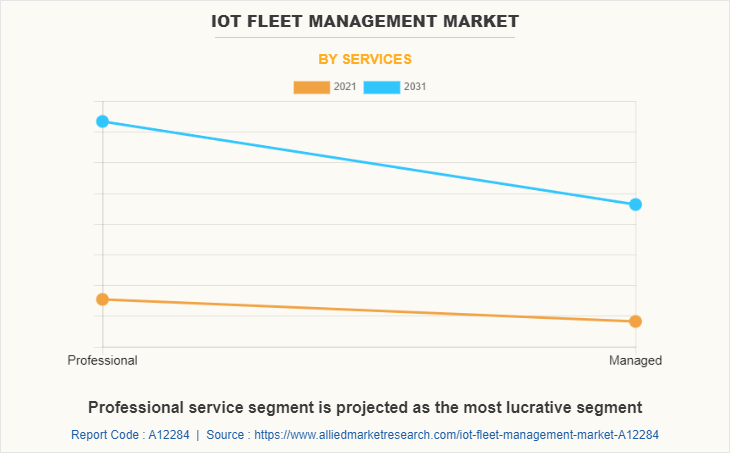
Increase in use of cloud-based technology for smart fleet management solutions
Smart devices and applications have become the go-to tools for fleet operators with increase in demand for connectivity and fleet management solutions. Tracking assets, driver monitoring, fleet optimization, and other related issues are addressed by cloud management solutions. Furthermore, cloud enables the backup and recovery of data and applications on a secondary storage or infrastructure. In addition, many organizations are deploying different cloud models to overcome the drawbacks of traditional fleet management solutions. For instance, apart from tracking Softweb’s cloud-based solution powered by big data analytics, AI, IoT, and other emerging technologies, smart fleet management-based solutions analyze information of fleet, such as route planning, fuel analytics, and driving patterns, to improve productivity and save fuel. Moreover, AI and machine learning capabilities facilitate autonomous dispatching & routing and empower fleet managers to predict vehicle health and driving habits based on the vehicle’s utilization along with lower maintenance requirements and cost-effectiveness. All these factors significantly contribute toward the growth of the market.
High price of fleet management systems
High cost of fleet management systems and other activities majorly affect the return on investment (ROI) of local fleet management businesses as they can barely afford it. As per the statistics given by Expert Market, installation cost for a fleet management system can vary from $100 to $200 for advanced tier system. The additional costs incurred while providing connectivity in the vehicle may act as a restraint for the IoT fleet management market. Providing connectivity solutions in the vehicle externally incurs additional expenses to the consumers in the form of hardware, connectivity solutions, and telecom service charges. These additional costs applied may have a significant impact on the IoT fleet management industry. In addition, cost of labor, connectivity, and other activities are anticipated to hinder the growth of local businesses, which affects the IoT fleet management business opportunities.
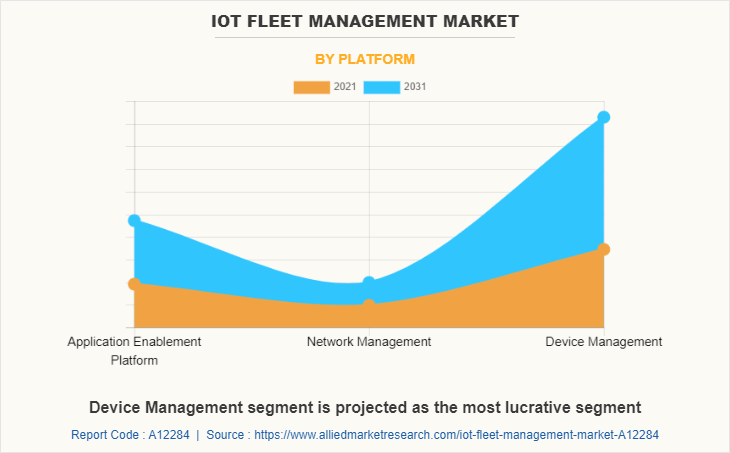
Better driver and vehicle safety
Safety is one of the top work challenges faced by fleet operators. Thus, the demand for technologically innovative applications such as alarm systems, real-time notification devices, driver behavior monitoring systems, and other AI-based software has increased, due to the disastrous impact of accidents and other emergencies. Furthermore, integrating IoT & telematics in the automotive industry fetched key innovations for vehicle & driver’s safety creates wider scope for the growth of the market. Real-time monitoring, geo-fencing, advanced driver assistance systems (ADAS), and diagnostic features are incorporated in railways, marine transport, and automotive due to increase in demand for fleet safety and security in transportation of goods and passengers. According to experts, fleet management is expected to grow rapidly in developing nations. Asia-Pacific witnessed strong adoption of fleet management solutions, such as installation of global positioning system (GPS) in commercial vehicles, due to regulatory mandates. Tracking and follow-up of fleet and driver are the major tasks of a fleet manager. In addition, accidents have increased at a considerable rate, which have become a crucial matter to be handled by the fleet owners. Moreover, safety and security of both the driver & vehicle has always been crucial from the perspective of consumers as well as auto manufacturers. In case of accidents, these smart fleet management operated vehicles can send an SOS message along with the coordinates of the driver’s location. In case of theft, owners can track their vehicles instantly using a smartphone app developed for this purpose. Therefore, increase in need for safety and security is expected to boost the growth of the IoT fleet management market.
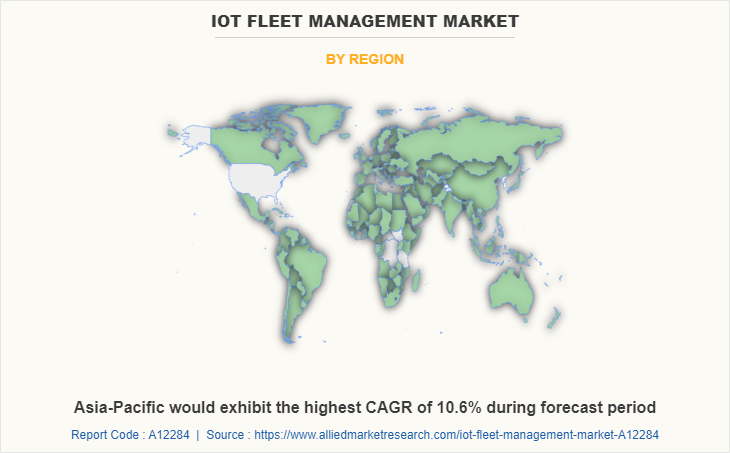
Key Benefits For Stakeholders
- This report provides a quantitative analysis of the market segments, current trends, estimations, and dynamics of the IoT fleet management market analysis from 2021 to 2031 to identify the prevailing IoT fleet management market opportunities.
- The market research is offered along with information related to key drivers, restraints, and opportunities.
- Porter's five forces analysis highlights the potency of buyers and suppliers to enable stakeholders make profit-oriented business decisions and strengthen their supplier-buyer network.
- In-depth analysis of the IoT fleet management market segmentation assists to determine the prevailing market opportunities.
- Major countries in each region are mapped according to their revenue contribution to the global market.
- Market player positioning facilitates benchmarking and provides a clear understanding of the present position of the market players.
- The report includes the analysis of the regional as well as global IoT fleet management market trends, key players, market segments, application areas, and market growth strategies.
IoT Fleet Management Market Report Highlights
| Aspects | Details |
| Market Size By 2031 | USD 16 billion |
| Growth Rate | CAGR of 9.8% |
| Forecast period | 2021 - 2031 |
| Report Pages | 353 |
| By Application |
|
| By Services |
|
| By Platform |
|
| By Type |
|
| By Region |
|
| Key Market Players | Vnomics, International Business Machines Corporation (IBM), Telefonica S.A, Sierra Wireless, Verizon Communications Inc, Omnitracs, Tomtom International BV, Fleet Complete, Cisco Systems Inc., Trimble Inc, Intel Corporation, NORTHRUP GRUNMAN, Webfleet Solution, Honeywell International Inc., AT&T Inc. |
Analyst Review
The adoption of IoT fleet management technology-based software is on a rise due to the development of advanced safety and security solutions. The developing and developed economies are focusing on the deployment of such technologies to enhance the transportation network and its infrastructure.
Factors such as technological advancements across transportation & logistics sector, and increase in use of cloud-based technology for smart fleet management solutions are anticipated to boost the growth of the global IoT fleet management market during the forecast period. However, high price of fleet management systems, and lack of uninterrupted & seamless internet connectivity are expected to hinder the growth of the global IoT fleet management market during the forecast period. Moreover, better driver and vehicle safety, and strengthening communication network is expected to create an opportunity for the IoT fleet management market in near future.
To fulfil the changing demand scenarios, market participants are concentrating on product launch and product developments efforts to match changing end-user requirements. For instance, in December 2020, Verizon launched a small business fleet management solution called plug-and-play device to access vehicle near-real-time location information either via an iOS or android enabled app or on the reveal website to increase productivity & efficiency. Moreover, in July 2019, Trimble, Inc. launched its TMW.Suite and TruckMate transportation management system (TMS) solutions via a cloud-based subscription model. TMW.Suite and TruckMate are two of Trimble's flagship TMS solutions, which enable transportation and logistics providers to better manage their transportation operations and improve efficiencies throughout their organization. In addition, market participants are continuously focusing on business expansion efforts to expand their geographic presence and meet new business opportunities. For instance, in March 2022, Verizon Communications, Inc. collaborated with Amazon Web Services, Inc. to fully migrate its fleet management software platform- Verizon Connect Reveal- to the cloud service subsidiary of Amazon.com, Inc.
The key players that operate in this market are AT&T Inc., Cisco Systems Inc, Fleet Complete, Honeywell International Inc., Intel Corporation, International Business Machines Corporation (IBM), Northrop Grumman Corporation, Omnitracs, Sierra Wireless, Telefonica S.A, Tomtom International BV, Trimble Inc., Verizon Communications Inc., Vnomics, and Webfleet Solution (Bridgestone Mobility Solutions B.V.)
The global IoT fleet management market was valued at USD 6.4 billion in 2021, and is projected to reach USD 16 billion by 2031,
Asia-Pacific is the largest regional market for IoT fleet management
The global IoT fleet management market is projected to grow at a compound annual growth rate of 9.8% from 2022 to 2031.
The key players that operate in this IoT fleet management market are AT&T Inc., Cisco Systems Inc, Fleet Complete, Honeywell International Inc., Intel Corporation, International Business Machines Corporation (IBM), Northrop Grumman Corporation, Omnitracs, Sierra Wireless, Telefonica S.A, Tomtom International BV, Trimble Inc., Verizon Communications Inc., Vnomics, and Webfleet Solution (Bridgestone Mobility Solutions B.V.).
Factors such as technological advancements across transportation & logistics sector, and increase in use of cloud-based technology for smart fleet management solutions are anticipated to boost the growth of the global IoT fleet management market during the forecast period. However, high price of fleet management systems, and lack of uninterrupted & seamless internet connectivity are expected to hinder the growth of the global market during the forecast period. Moreover, better driver and vehicle safety, and strengthening communication network is expected to create an opportunity for the IoT fleet management industry in near future.
Loading Table Of Content...



